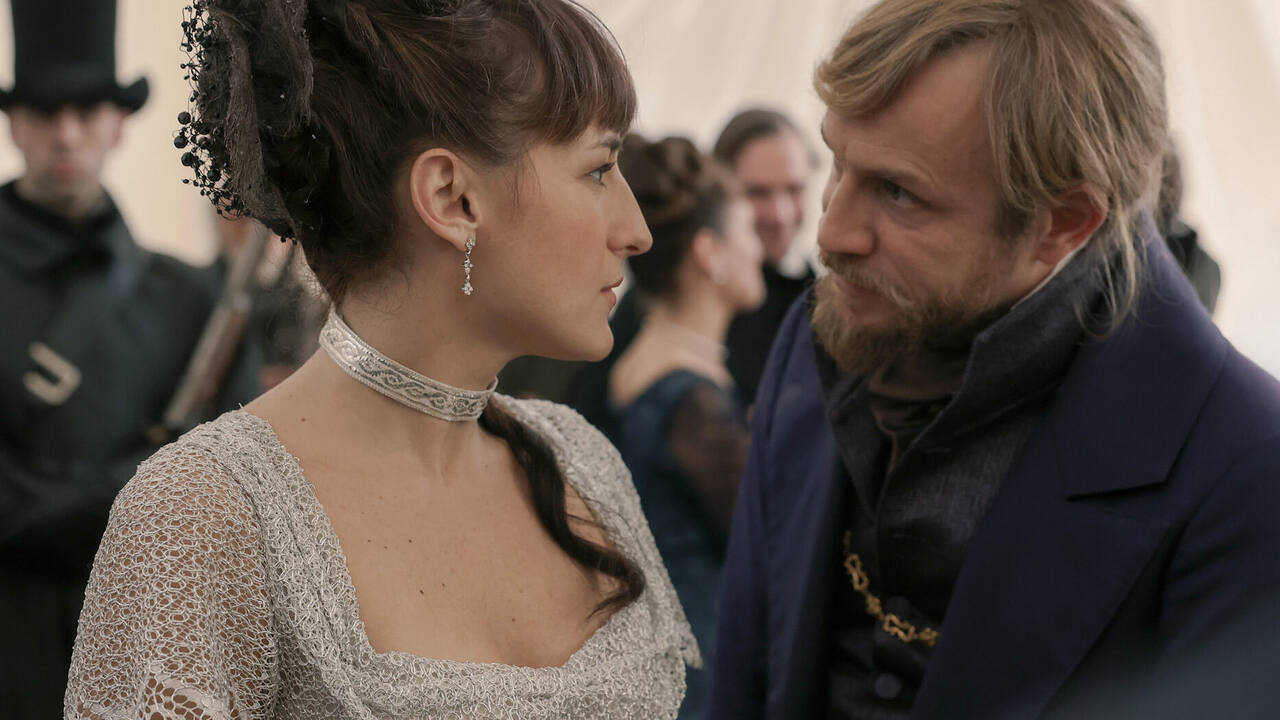
“A Recipe for a Disaster” feels like the moment Carême stops simmering and finally comes to a controlled, ambitious boil. Episode 3 plants its flag squarely in the turbulent space where art, ambition, and politics cross wires, and while it doesn’t always land every note, it confidently pushes its story—and its characters—into the murkier, more gripping territory.
This chapter sends Antonin Carême on a rather unexpected detour. Talleyrand, ever the puppet master, tasks him with delivering a cake to a revolutionary. That might sound like a half-baked errand on paper, but in practice, it becomes one of the episode’s most compelling frameworks. There’s a palpable tension as Carême enters volatile territory, both geographically and morally. His interactions with the so-called enemy aren’t loud or preachy—they’re laced with small gestures, loaded glances, and lines that mean more in context than they do on the page.
What works about Episode 3 is how it begins to undo the delicate stitchwork of Carême’s world. Up until now, he’s been skirting the edges of Parisian politics, but here, he’s thrust into its heart—and we start to see what that might cost him. Benjamin Voisin does fine work here, peeling back more layers of Carême’s interior life without relying on monologues or dramatic declarations. His silences speak volumes, especially in a scene where he watches a public hanging with a mixture of horror and numb curiosity. It’s a moment that doesn’t scream its significance but lingers long after it ends.
Tonally, the show keeps walking its tightrope between elegance and unrest. The visuals are a standout once again, as chandeliers drip with light while soot smudges the air in the street scenes. This duality of opulence and desperation grounds the stakes of Carême’s journey. You believe in his desire to escape the blood and grime, not out of cowardice, but because he genuinely believes in a world made better by beauty and craft. This is someone who still thinks a cake can be revolutionary in its own right.
The episode also expands its emotional range. We get a brief but moving glimpse into Carême’s childhood, and though it’s not lingered on, it colors much of what follows. His reaction to the revolutionaries' makeshift banquet—served in a decaying tenement but prepared with sincere, if clumsy, care—is not mockery but something closer to awe. It’s a reminder that Carême isn't just ambitious—he’s deeply romantic about food. Not sentimental, but reverent. This is food as language, as a way of connecting across class and ideology. And here, it works.
If there’s a crack in the crust, it’s in the pacing. The episode occasionally drifts, particularly during the scenes back at Talleyrand’s estate, which feels like unnecessary breathers rather than tension builders. While Jérémie Renier remains delightfully serpentine as Talleyrand, the political conversations sometimes veer into the static. For a show that thrives on subtle power plays and slow burns, Episode 3 spends just a bit too long fanning the embers.
Also, while the idea of Carême navigating revolutionary politics through food is novel and potentially brilliant, the show only starts to scratch at what that really means. There’s a missed opportunity in not letting the culinary scenes carry more of the dramatic weight. One gets the sense that Carême could be turning a pastry into a political statement, or using ingredients to speak a coded language, but that potential is left mostly unexplored here. Instead, food appears more as a tool or a symbol, rather than a narrative engine.
Still, those are criticisms of a show that’s clearly reaching for something bigger than itself. And to its credit, it mostly succeeds. “A Recipe for a Disaster” is tightly acted, gorgeously shot, and carefully written. It’s less about dramatic payoffs and more about pressure building just under the surface. It teases consequences without throwing them in your face, and for a series that’s as much about control as it is about chaos, that restraint is part of the appeal.
What Carême is proving, three episodes in, is that it isn’t afraid to complicate its hero. Antonin is no longer just a culinary prodigy with big dreams—he’s a young man navigating a labyrinth of power, trying to stay clean in a city soaked in both blood and butter. Episode 3 captures that balancing act with style and enough narrative daring to keep things compelling, even when the tempo slows.
By the end of the episode, you’re left with more questions than answers, and not in a frustrating way. The story is building toward something, and if it sticks the landing, these small narrative gambles will pay off. “A Recipe for a Disaster” is not flawless, but it’s bold, thoughtful, and just sharp enough to cut through the noise.
Final Score- [8/10]
Get all latest content delivered to your email a few times a month.
Bringing Pop Culture News from Every Realm, Get All the Latest Movie, TV News, Reviews & Trailers
Got Any questions? Drop an email to [email protected]